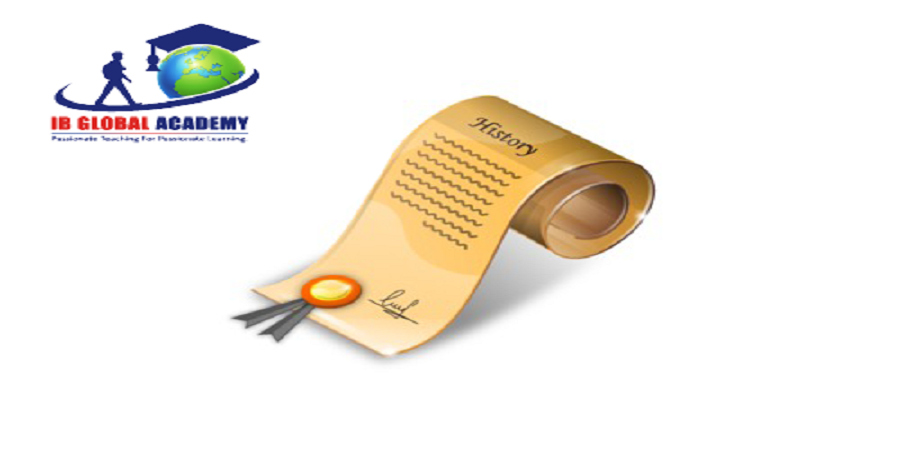




 08/15/2023
08/15/2023
The history curriculum for the IB has experienced major changes throughout the years, ensuring that students get a thorough and contemporary education in the subject.
Since history is a constantly dynamic subject, it is essential that the curriculum be updated to reflect new findings, differing viewpoints, and shifting global circumstances.
We will examine the development of the IB History syllabus in this blog post, emphasizing its creation, alterations, and justifications for those changes.
The International Baccalaureate Organisation was founded in 1968, which is when the IB History curriculum first appeared. The founders were aware early on of the value of an all-encompassing, global education that included history as well as other academic areas.
The organization's purpose, which is to create curious, informed, and compassionate young people who are prepared to comprehend and involve with the intricate details of the world, has had a guiding influence on the curriculum over time.
The changing character of historical study is reflected in the development of the IB History curriculum.
The curriculum gives students the skills they need to successfully negotiate the intricacies of the past and present by responding to evolving research, combining other viewpoints, and addressing contemporary challenges.
The IB History curriculum enables students to gain a sophisticated perspective of the world around them in addition to preparing them for further academic endeavours through a comprehensive approach that places an emphasis on critical thinking, analytical abilities, and empathy.
It is evidence of the IB organization's continuous dedication to offering a thorough and current history education.
A comprehensive view of history: One of the IB courses in India
The IB History curriculum's comprehensive approach, which pushes learners to contemplate many narratives, investigate numerous historical viewpoints, and critically assess sources, is one of its main advantages.
Students get a more thorough grasp of events in history and their effects on various communities by analyzing multiple perspectives and interpretations. This method encourages students to be tolerant, open-minded, and empathic, enabling them to engage in complicated discussions and grow into responsible global citizens.
Expansion and Development of the curriculum
Students were given a thorough introduction to world history in the first edition of the IB History curriculum. But as historical investigation advanced and fresh viewpoints surfaced, it became clear that the curriculum required improvement.
In answer, the IB organization worked with universities, historians, subject matter experts, and educators to create a curriculum that was more precise and detailed.
As a result, case studies, regional alternatives, and theme methods were introduced, enabling students to learn more about particular historical settings and develop a better comprehension of historical processes and events.
Foundational Ideas
The IB History curriculum is based on a number of guiding concepts that influence both its creation and execution. First and foremost, it seeks to foster a profound and comprehensive understanding of history that takes into account its political, economic, social, and cultural facets.
Students obtain a complete understanding of the interconnectivity of events in history and their broader ramifications by studying history via a variety of lenses.
In order to develop the abilities needed to evaluate the validity, bias, and context of diverse primary and secondary sources, the curriculum promotes students' critical engagement with historical sources.
This focus on source analysis develops students' capacity to formulate well-reasoned arguments and render defensible conclusions.
A global perspective is encouraged by the IB History curriculum. In order to encourage students to investigate other views, narratives, and cultures, it emphasizes the investigation of both local and global history.
By comprehending various historical settings, students get a more comprehensive grasp of individual experiences, fostering intercultural awareness and empathy.
The curriculum aims to promote the growth of transferrable abilities including research, communication, and critical thinking.
Students develop their ability to pose thought-provoking queries, decipher complicated problems, and clearly communicate their conclusions via historical research.
These abilities empower students to flourish in a range of professional domains in addition to preparing them for future academic study.
Global Mindedness
The DP history curriculum has been created in a way that expressly reinforces the need of cultivating an international perspective.
For instance, perspectives—and more especially, the emphasis on fostering students' appreciation of various perspectives—are one of the course's main principles that run throughout the whole curriculum. To take help on history you can employ an IB tutor in Gurgaon-India from IBGA!
A global perspective is ensured in the course by requiring all students to examine case studies and examples from various parts of the world and compare them.
Furthermore, teachers are given a great deal of leeway to select pertinent instances to discuss with their students, assisting them in making arrangements to ensure the course fulfills their needs and interests regardless of where they are located or the environment in which they are taking it.
Students get the chance to investigate historical occurrences that have had a significant impact on the way the world is today throughout the IB DP history course, which helps them better appreciate how complicated and interwoven past and present events are.
For instance, students look at historical instances of many of the contemporary global issues including war, rights, and government.
This contributes to achieving one of the course's main objectives, which is to assist students in better understanding themselves and modern society by promoting historical reflection.